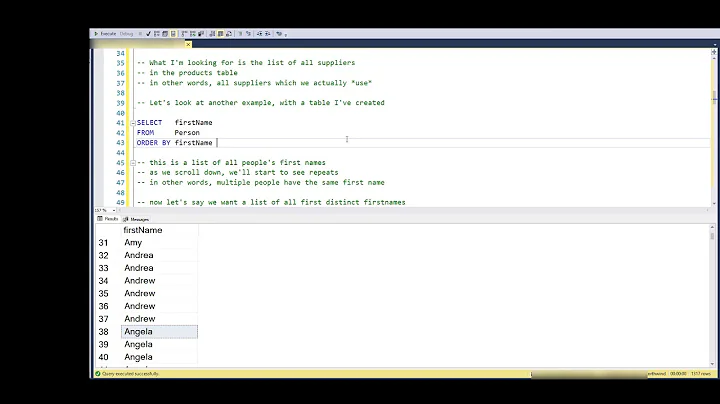What's faster, SELECT DISTINCT or GROUP BY in MySQL?
Solution 1
They are essentially equivalent to each other (in fact this is how some databases implement DISTINCT under the hood).
If one of them is faster, it's going to be DISTINCT. This is because, although the two are the same, a query optimizer would have to catch the fact that your GROUP BY is not taking advantage of any group members, just their keys. DISTINCT makes this explicit, so you can get away with a slightly dumber optimizer.
When in doubt, test!
Solution 2
If you have an index on profession, these two are synonyms.
If you don't, then use DISTINCT.
GROUP BY in MySQL sorts results. You can even do:
SELECT u.profession FROM users u GROUP BY u.profession DESC
and get your professions sorted in DESC order.
DISTINCT creates a temporary table and uses it for storing duplicates. GROUP BY does the same, but sortes the distinct results afterwards.
So
SELECT DISTINCT u.profession FROM users u
is faster, if you don't have an index on profession.
Solution 3
All of the answers above are correct, for the case of DISTINCT on a single column vs GROUP BY on a single column. Every db engine has its own implementation and optimizations, and if you care about the very little difference (in most cases) then you have to test against specific server AND specific version! As implementations may change...
BUT, if you select more than one column in the query, then the DISTINCT is essentially different! Because in this case it will compare ALL columns of all rows, instead of just one column.
So if you have something like:
// This will NOT return unique by [id], but unique by (id,name)
SELECT DISTINCT id, name FROM some_query_with_joins
// This will select unique by [id].
SELECT id, name FROM some_query_with_joins GROUP BY id
It is a common mistake to think that DISTINCT keyword distinguishes rows by the first column you specified, but the DISTINCT is a general keyword in this manner.
So people you have to be careful not to take the answers above as correct for all cases... You might get confused and get the wrong results while all you wanted was to optimize!
Solution 4
Go for the simplest and shortest if you can -- DISTINCT seems to be more what you are looking for only because it will give you EXACTLY the answer you need and only that!
Solution 5
well distinct can be slower than group by on some occasions in postgres (dont know about other dbs).
tested example:
postgres=# select count(*) from (select distinct i from g) a;
count
10001
(1 row)
Time: 1563,109 ms
postgres=# select count(*) from (select i from g group by i) a;
count
10001
(1 row)
Time: 594,481 ms
http://www.pgsql.cz/index.php/PostgreSQL_SQL_Tricks_I
so be careful ... :)
Related videos on Youtube
Nancy Goyal
Updated on October 10, 2021Comments
-
Nancy Goyal over 2 years
I am still new to regular expressions, as in the Python library
re.I want to extract all the proper nouns as a whole word if they are separated by space.
I tried
result = re.findall(r'(\w+)\w*/NNP (\w+)\w*/NNP', tagged_sent_str)Input: I have a string like
tagged_sent_str = "European/NNP Community/NNP French/JJ European/NNP export/VB"Output expected:
[('European Community'), ('European')]Current output:
[('European','Community')]But this will only give the pairs not the single ones. I want all the kinds
-
 Strawberry almost 10 yearsYou could test for yourself as quickly as ask the question. Irritatingly, it is almost impossible to construct a scenario in which DISTINCT outperforms GROUP BY - which is annoying because clearly this is not the purpose of GROUP BY. However, GROUP BY can produce misleading results, which I think is reason enough for avoiding it.
Strawberry almost 10 yearsYou could test for yourself as quickly as ask the question. Irritatingly, it is almost impossible to construct a scenario in which DISTINCT outperforms GROUP BY - which is annoying because clearly this is not the purpose of GROUP BY. However, GROUP BY can produce misleading results, which I think is reason enough for avoiding it. -
Aung Myo Linn almost 8 yearsThere's another duplicate with a different answer. see MySql - Distinct vs Group By <<< it says GROUP BY is better
-
Aung Myo Linn almost 8 yearsPlease see here if you want to measure the time difference between DISTINCT and GROUP BY running your query.
-
 Chris over 4 yearsWhat should happen if there are three (or more) consecutive NNPs?
Chris over 4 yearsWhat should happen if there are three (or more) consecutive NNPs? -
Nancy Goyal over 4 yearsIt should give all the consecutive NNPs together
-
-
SquareCog about 15 yearsThey are the same in terms of what they get, not in terms of how they get it. An ideal optimizer would execute them the same way, but MySQL optimizer is not ideal. Based on your evidence, it would seem that DISTINCT would go faster -- O(n) vs O(n*log n).
-
vava about 15 yearsSo, "using filesort" is essentially bad thing?
-
SquareCog about 15 yearsIn this case it is, because you don't need to sort (you would if you needed the groups). MySQL sorts in order to place the same entries together, and then get groups by scanning the sorted file. You just need distincts, so you just have to hash your keys while doing a single table scan.
-
Quassnoi about 15 yearsDISTINCT will be faster only if you DON'T have an index (as it doesn't sort). When you do have an index and it's used, they're synonyms.
-
 a_horse_with_no_name over 10 yearsAlthough this question is about MySQL it should be noted that the second query will work only in MySQL. Nearly every other DBMS will reject the second statement because it's an invalid use of the GROUP BY operator.
a_horse_with_no_name over 10 yearsAlthough this question is about MySQL it should be noted that the second query will work only in MySQL. Nearly every other DBMS will reject the second statement because it's an invalid use of the GROUP BY operator. -
daniel.gindi over 10 yearsWell, "nearly" is a problematic definition :-) It would be much more helpful if you state a specific DBMS that you have tested to see that it generates an error for this statement.
-
 a_horse_with_no_name over 10 yearsPostgres, Oracle, Firebird, DB2, SQL Server for starters. MySQL :sqlfiddle.com/#!2/6897c/1 Postgres: sqlfiddle.com/#!12/6897c/1 Oracle: sqlfiddle.com/#!12/6897c/1 SQL Server: sqlfiddle.com/#!6/6897c/1
a_horse_with_no_name over 10 yearsPostgres, Oracle, Firebird, DB2, SQL Server for starters. MySQL :sqlfiddle.com/#!2/6897c/1 Postgres: sqlfiddle.com/#!12/6897c/1 Oracle: sqlfiddle.com/#!12/6897c/1 SQL Server: sqlfiddle.com/#!6/6897c/1 -
Ariel over 9 yearsYou can add
ORDER BY NULLto theGROUP BYto avoid the sort. -
Ariel over 9 yearsAdd
ORDER BY NULLto theGROUP BYversion and they will be the same. -
rustyx over 9 yearsThe definition of
DISTINCTandGROUP BYdiffer in thatDISTINCTdoesn't have to sort the output, andGROUP BYby default does. However, in MySQL even aDISTINCT+ORDER BYmight still be faster than aGROUP BYdue to the extra hints for the optimizer as explained by SquareCog. -
Pankaj Wanjari over 8 yearsDISTINCT is much faster with large amount data.
-
Lizardx about 8 yearsI tested this, and found that on an indexed column, mysql, group by was about 6x slower than distinct with a fairly complicated query. Just adding this as a datapoint. About 100k rows. So test it and see for yourselves.
-
Aung Myo Linn almost 8 yearssee MySql - Distinct vs Group By <<< it says GROUP BY is better
-
 Thanh Trung almost 5 yearsStill slower even with grouping by null
Thanh Trung almost 5 yearsStill slower even with grouping by null -
Quassnoi almost 5 years@ThanhTrung: what is slower than what?
-
 Thanh Trung almost 5 years@Quassnoi groupby slower than distinct even if avoiding sort
Thanh Trung almost 5 years@Quassnoi groupby slower than distinct even if avoiding sort -
Nancy Goyal over 4 yearsThank you Chris for your answer. This works well as required but I was wondering if this can be done with regular expression
-
 Wiktor Stribiżew over 4 years@NancyGoyal You can't use a single regex method call because the texts you want to appear inside a single string result are not adjoining in the input.
Wiktor Stribiżew over 4 years@NancyGoyal You can't use a single regex method call because the texts you want to appear inside a single string result are not adjoining in the input. -
 Admin over 4 yearsis equal to
Admin over 4 yearsis equal toSELECT profession FROM users GROUP BY profession -
 Matthew Lenz about 4 yearsNote: Order qualifiers on GROUP BY were deprecated in MySQL 8.
Matthew Lenz about 4 yearsNote: Order qualifiers on GROUP BY were deprecated in MySQL 8. -
 Bernardo Loureiro almost 4 yearsGROUP BY is also faster than DISTINCT in AWS Redshift, because GROUP BY uses a
Bernardo Loureiro almost 4 yearsGROUP BY is also faster than DISTINCT in AWS Redshift, because GROUP BY uses aXN HashAggregateand DISTINCT uses aXN Unique. It is the same problem that older versions of Postgres have. -
 Marinos An about 3 yearsAnd to confuse us :) , mysql allows using
Marinos An about 3 yearsAnd to confuse us :) , mysql allows usingselect distinct(a), bwhich meansselect distinct a, b, which means distinct on the pair.
![MySQL Tutorial for Beginners [Full Course]](https://i.ytimg.com/vi/7S_tz1z_5bA/hq720.jpg?sqp=-oaymwEcCNAFEJQDSFXyq4qpAw4IARUAAIhCGAFwAcABBg==&rs=AOn4CLDQRzwgDiYUwdEuDvClYax7UBqlWA)









